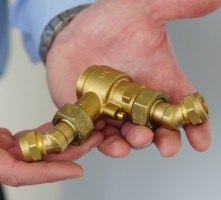Human activity is responsible for the UK experiencing hotter days and ‘tropical’ nights, according to a recent report from our Met Office, so every action taken to build and maintain homes to reduce carbon emissions will help.
Today, and in the foreseeable future, local authorities and social housing providers are, and will, continue to be under increasing pressure to find ways to make the homes they supply, and manage, more energy efficient.
Which is why Teddington is supporting this with two innovative designs that we believe will be vital in helping housing associations to meet the requirements of the Climate Change Act.
In the UK, there are currently 4 million social housing homes and all of them need to meet the requirements of the Act to reduce their carbon footprint.
Teddington’s clever designs include a new improved version of its award-winning energy-saving CombiSave device (pictured), aimed at reducing water usage and carbon emissions for households that use a combination boiler, while also helping tenants to save money on their heating bills.
 Additionally, we recently brought to market our innovative PressureSentry warning device, which detects low-pressure in the heating system to prevent unnecessary boiler shut-downs and heating-system damage.
Additionally, we recently brought to market our innovative PressureSentry warning device, which detects low-pressure in the heating system to prevent unnecessary boiler shut-downs and heating-system damage.
Ultimately, it prevents unscheduled call outs from social housing providers’ maintenance departments, reducing attendance costs and also the carbon footprint from vehicles making the visit.
Both designs have massive benefits for social housing tenants who are more likely to be on reduced incomes and will welcome smaller fuel bills and less hassle.
Climate change threat
Kenny Maxwell, (below) Teddington’s sales manager says: “Every action helps since we know that climate change is a huge threat to humanity. It’s already having an effect.”
Greenpeace says that average global temperatures have risen every decade since the 1970s with the ten warmest years on record all occurring since 1997. In 2017, the UK’s carbon dioxide emissions were 43 per cent below its 1990 levels. The 2008-12 carbon emissions budget has also been met and we are outperforming the second and third carbon budgets, according to the Committee on Climate Change.
But the committee says the same is not true of the fourth period, 2023-27. Teddington is urging developers, social housing providers and other domestic heating installers in the private sector to take advantage of the energy-saving devices it markets to help the situation.
The government’s Clean Growth Strategy wants all homes to achieve a band C Energy Performance Certificate by 2030 and the Energy Savings Trust says there is more work to be done.
Kenny says that with the growing number of regulations it makes sense for social housing providers to look at their asset management budgets to fund these changes to reduce their carbon footprint.
“There are already restrictions on how much social housing providers can increase their rents to fund these budgets,” he said. “Our innovations amount to simple changes with big benefits to both the housing provider and their tenants.”
So, what is CombiSave? It’s a small thermostatically controlled valve that can be fitted to most combination boilers and helps to reduce water wastage.
The low-cost device, which can be fitted in minutes, automatically controls the flow of water every time a hot tap is turned on – allowing the boiler to heat the water faster and only returning the flow to normal once a useable temperature is reached.
Independent research by consultants EA Technology, based around an International Boiler Test Standard, has shown the CombiSave can save an average of 27,756 litres of water a year for a typical two-person household.
A little over 600 kWh of energy is also saved in the heating process, reducing CO2 emissions by 130kg a year.
Benefits
Kenny said the benefits for housing associations could be far reaching: “Fitted in 50,000 homes it could save the equivalent to a whole reservoir of water every year, as well as reducing CO2 levels by 6,500 tonnes.
“It represents a relatively simple, cost-effective opportunity for housing associations to reduce the carbon footprint of their overall portfolio while at the same time helping tenants to save money on their utility bills.”
Ben Evans, from plumbing experts Parr and Evans Heating in Bristol, added: “We advise most people to get a CombiSave fitted and we’re now installing about one a week. It’s been very good. It works out as a decent saving.”
Earlier this year CombiSave was awarded a ‘Recommended Checkmark’ from Waterwise, the leading independent authority on water efficiency in the UK and Europe.
.jpg) Aaron Burton, Director of Policy and Innovation at Waterwise, which runs the Recommended Checkmark scheme to highlight the most water-efficient products and services in the UK, said: “The CombiSave product addresses a real source of wasted water in the home. It’s a great combination of water saving whilst keeping the same level of performance, which is what water efficiency is all about.”
Aaron Burton, Director of Policy and Innovation at Waterwise, which runs the Recommended Checkmark scheme to highlight the most water-efficient products and services in the UK, said: “The CombiSave product addresses a real source of wasted water in the home. It’s a great combination of water saving whilst keeping the same level of performance, which is what water efficiency is all about.”
In July 2017, the Water Regulation Advisory Scheme also renewed its accreditation of the CombiSave for a further five years.
PressureSentry, pictured left) meanwhile, is an early warning device that helps prevent central heating breakdowns caused by low pressure.
Low pressure, caused by leaks or a build-up of trapped air, is behind the majority of emergency call outs – leaving housing associations facing costly repair bills and tenants without heating and hot water for potentially lengthy periods of time.
With PressureSentry, as soon as the pressure falls below a pre-set level (1 bar) an audible, 360-degree visual alarm is triggered. The sound can be muted but the flashing indicator stays on until the system pressure has been reinstated.
Housing associations can then arrange for work to re-pressurise the system before it falls too low – preventing further damage, boiler shut downs, and huge emergency bills.
PressureSentry is ideally suited for combi-boiler heating systems and screws into the top of a standard domestic radiator to monitor the system pressure. The low-cost device can be installed by qualified engineers during routine service calls – with no need to drain the heating system.
Kenny said: “All too often combi-boilers shut down unnecessarily due to a loss of system pressure, mainly because checking the water pressure is overlooked or forgotten about, or the boiler is inaccessible. This results in unscheduled call-outs which can be very costly.
“With PressureSentry, advanced warning is provided so that housing associations can schedule a visit by their local plumber or heating engineer to re-pressurise the system before it cuts out – meaning that tenants don’t face the prospect of a cold house and having to wait a few days with no hot water.”

